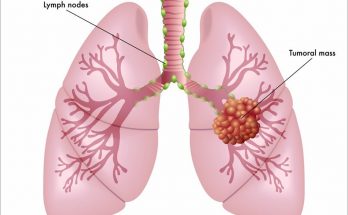Bronchitis is an inflammation of the mucous membrane (lining) of the bronchial tubes. Characteristically, there is an increase mucus production, bronchial swelling, and ciliary dysfunction. Acute bronchitis is usually of a short duration and milder course, while chronic bronchitis is characterized by a distressing, productive, and persistent cough.
Acute Bronchitis
Acute bronchitis is generally caused by infectious agents such as bacteria and viruses and is more prevalent in the winter. Acute bronchitis doesn’t last long and has a less severe course. It is often preceded by the common cold. Predisposing factors include exposure to the infectious agent, crowded conditions, fatigue and malnutrition. Symptoms of acute bronchitis are chills, sore throat, malaise, soreness, coughing, and fever.
Diagnosis is usually based on the symptoms and signs. Bedrest, fluids (up to 3 or 4 L), antibiotics, and an antipyretic analgesic medication such as aspirin or acetaminophen are used to treat acute bronchitis. Avoid cough suppressants as the cough acts to clear mucus. Other causes of acute irritation and inflammation of the bronchial tubes are the inhalation of chemical (fumes) or physical (dust) agents.
Chronic Bronchitis
Chronic bronchitis is characterized by a productive cough, mucus overproduction, and inflammation of the bronchial tubes lasting 3 months or more in 2 consecutive years. Patients are usually diagnosed in their 30’s and 40’s. The overwhelming indicative factor is a history of smoking. Other sources of environmental pollution can cause chronic bronchitis as well. Irritation causes increased growth of mucous secreting glands in the lining of the bronchial tree. A protease-antiprotease imbalance may be important to the development of chronic bronchitis as it is in emphysema. Treatment may necessitate climate or occupational changes, but the first choice is to encourage smoking cessation. Antibiotics are sometime prescribed to prevent secondary bacterial infections progressing to pneumonia. Chronic bronchitis may progress to the more severe COPD (Chronic Obstructive Pulmonary Disease), emphysema.
